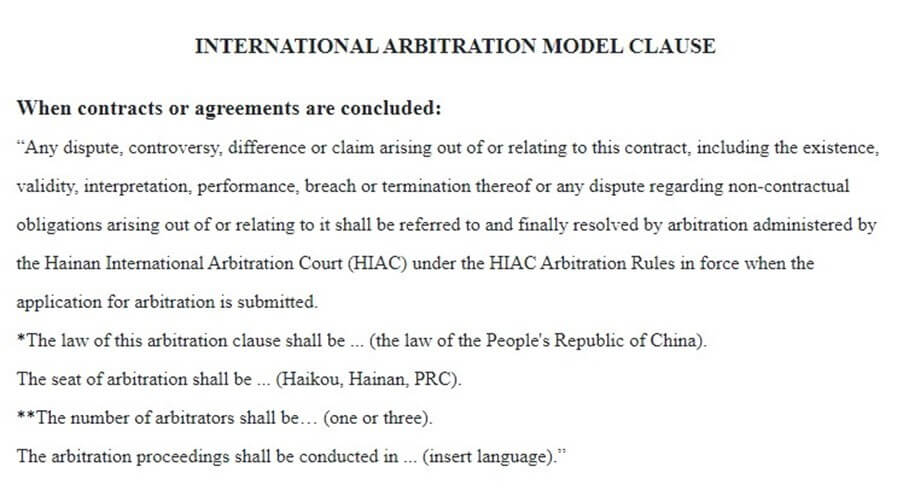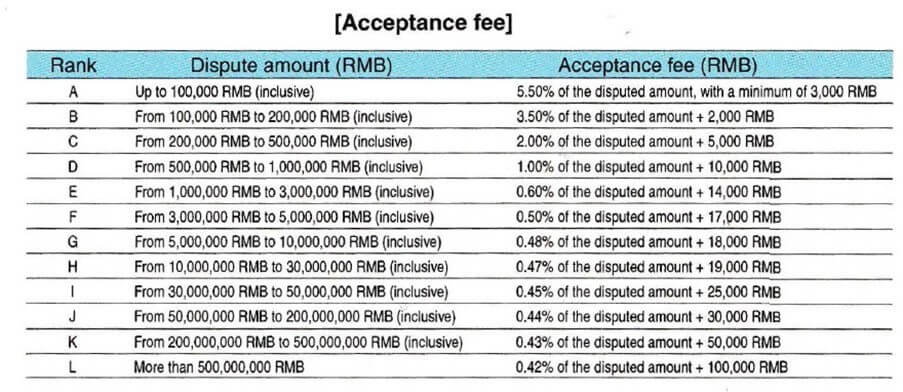International arbitration in Hainan has gained prominence in recent years due to China’s strategic development of the Province of Hainan as a free trade zone, a free trade port and, generally, an international business hub. Hainan is positioned to play a key role in handling commercial disputes, particularly within the context of cross-border investments and trade in the Asia-Pacific region.
In the following paragraphs, we will discuss the main features of international arbitration in Hainan – both institutional and ad hoc.
I. Institutional Arbitration in Hainan – HIAC Arbitration Rules
The Hainan International Arbitration Court[1] is a permanent arbitration institution for public interest that is legally established in Hainan. Its purpose is to “resolve contractual disputes and other disputes over property rights and interests between natural persons, legal persons and unincorporated associations”.[2]
The latest version of the HIAC Arbitration Rules came into force on 1 November 2020[3] (the “2020 HIAC Rules”). Its provisions address different phases of both domestic and international commercial arbitration. International commercial arbitration is defined as a commercial case including any of the following characteristics:[4]
- One or both parties are foreigners, stateless persons, foreign enterprises or other organisations;
- One or both parties have their habitual residence outside the territory of the People’s Republic of China;
- The subject matter in dispute is outside the territory of the People’s Republic of China;
- Legal facts that create, change, or terminate the commercial relationship have taken place outside the territory of the People’s Republic of China.
The 2020 HIAC Rules contain 88 Articles, which are divided into nine chapters:
- Chapter 1 – General Rules (Article 1 to Article 7)
- Chapter 2 – Arbitration Agreement (Article 8 to Article 11)
- Chapter 3 – Application for Arbitration, Defense and Counterclaim (Article 12 to Article 22)
- Chapter 4 – Arbitral Tribunal (Article 23 to Article 29)
- Chapter 5 – Arbitral Proceedings and Award (Article 30 to Article 59)
- Chapter 6 – Expedited Procedure (Article 60 to Article 66)
- Chapter 7 – Special Provisions for International Commercial Arbitration (Article 67 to Article 80)
- Chapter 8 – Period of Time and Service (Article 81 to Article 82)
- Chapter 9 – Supplementary Rules (Article 83 to Article 88)
A. Arbitration Agreement
Pursuant to Article 8(II) of the 2020 HIAC Rules, the arbitration agreement shall be “in written form”.[5] In cases where the arbitration agreement is contained in a contract, it is severable from such a contract, i.e., the validity of the arbitration agreement shall “not be affected by any variation, assignment, discharge, termination, invalidity, voidness or unenforceability, expiry, ineffectiveness, rescission or non-existence of the contract.”[6]
The HIAC has also put at the disposition of the parties several versions of model arbitration clauses. In the case of international commercial arbitration, the model arbitration clause reads as follows:

Article 1(V) of the 2020 HIAC Rules additionally outlines the circumstances under which the arbitration agreement can be inferred in favour of the HIAC, i.e., when the parties agree in an arbitration agreement (a) that the name of the arbitration institution is the Hainan Arbitration Commission or the Haikou Arbitration Commission, or (b) that the disputes shall be arbitrated by the local arbitration institution which can be inferred as designating the HIAC, or (c) that the disputes shall be arbitrated by a branch of the HIAC.[7]
B. Language of Arbitration, Seat of Arbitration, Place of Hearing
The parties are free to choose the language of the proceedings, the seat of the proceedings and the place of the hearings.
According to Article 4 of the 2020 HIAC Rules, in the absence of the parties’ agreement, the language of the arbitral proceedings shall be determined either by the HIAC or the arbitral tribunal “having regard to the particular circumstances.”[8]
In turn, when the parties do not choose a specific seat of arbitration in their arbitration agreement, Article 5 of the 2020 HIAC Rules sets forth a default rule that “the seat of arbitration shall be the domicile of the HIAC.”[9] It also stipulates that the HIAC “may also determine the seat of arbitration to be another location having regard to the circumstances of the case.”[10]
Regarding the venue of arbitration hearings, Article 33 of the 2020 HIAC Rules also provides that they shall be held “at the locality of the HIAC or its branch.”[11] However, the parties are at liberty to deviate from this default rule and choose to hold the hearing at a different location, bearing “the additional costs arising therefrom.”[12]
C. Number of Arbitrators
The parties may choose the number of arbitrators in their arbitration agreement. Absent such a choice, the 2020 HIAC Rules establish a default rule of three arbitrators for ordinary proceedings.[13] For international arbitration, Article 69 of the 2020 HIAC Rules further provides that if the parties “have particular agreement on the nationality, region or professional qualifications of the arbitrators, such agreement shall prevail.”[14]
The HIAC offers an online list of arbitrators, including domestic and foreign arbitrators. Pursuant to Article 23(II) of the 2020 HIAC Arbitration Rules, the parties may (but are not obliged to) nominate arbitrators from this list.[15] However, if the parties nominate arbitrators outside the HIAC list, they “shall provide the HIAC with the professional qualification, resume and contact information”[16] of such arbitrators for confirmation by the HIAC.
D. Commencement of HIAC Arbitration
According to Article 12 of the 2020 HIAC Rules, HIAC Arbitration shall begin with the submission by the claimant of an Application for Arbitration, which consists of (a) the arbitration agreement and (b) the Statement of Application, (c) the evidence and a list setting out the title and description, the source and the relevance of the evidence, and (d) proof of the claimant’s identity.[17]
In turn, the Statement of Application shall contain the following:[18]
- the name, residential address, postal code, telephone number, fax number and other effective and convenient means of communication with the claimant and the respondent, and of the legal representative or the person in charge where a party is a legal person or unincorporated association;
- the claim for relief and the facts and grounds on which the claim is based; and
- the signature and/or seal affixed by the claimant or its authorised representatives.
These requirements are the same for domestic and international arbitration.
Once the Application for Arbitration is accepted by the HIAC and the claimant pays the advance of arbitration fees (see below), then the HIAC shall serve a Notice of Arbitration to the respondent.[19]
Upon the acceptance of the Notice of Arbitration, the respondent shall have 15 days in domestic arbitration[20] and 30 days in international arbitration[21] to submit its Statement of Defence. It shall contain content similar to that of the Application for Arbitration.[22]
The respondent is also entitled to submit a counterclaim. However, it does not need to do so with its Statement of Defence. If the proceedings are oral, the respondent is required to submit the counterclaim before the end of the first oral hearing. This rule applies equally to domestic[23] and international arbitration.[24] Should the proceedings be conducted only on paper, i.e., without the need for a hearing,[25] the respondent is required to submit its counterclaim within 15 days in domestic arbitration[26] and 30 days in international arbitration[27] from the date of receipt of the Notice of Arbitration from the HIAC.
E. Time Limits to Render the Award
Depending on the character of the proceedings, the HIAC Rules impose different time limits for arbitral tribunals to render the award. In domestic arbitration, Article 51 of the 2020 HIAC Rules requires the arbitral tribunal to “render the award within 4 months from the date of its constitution”.[28] In turn, in international arbitration, Article 78 provides that the award shall be rendered “within 6 months […] from the date on which the arbitral tribunal is composed.”[29] Both above-referenced provisions, however, specify that if special circumstances warrant an extension of these time limits, the Presiding Arbitrator may apply to the Chairman, i.e., the President of the HIAC,[30] for approval of the extension.[31]
F. Costs of HIAC Arbitration and Third-Party Funding
The costs of HIAC arbitration depend on the amount in dispute and are payable on an advance basis. Pursuant to Article 13 of the 2020 HIAC Rules, the claimant “that files for arbitration shall, within 5 days upon receipt of the written notice, pay in advance the arbitration fees in accordance with the provisions of the HIAC Schedule of Arbitration Fees.”[32] As per Article 16(III), the payment obligations under Article 13 apply equally to an application for a counterclaim.[33]
These arbitration fees are called the acceptance fee and a handling fee, and are calculated as follows:

The parties may use the HIAC online calculator to determine the amount of the acceptance and handling fees.
The HIAC Rules also contain a specific provision regarding the issue of third-party funding in the context of international arbitration. Pursuant to Article 72, “any party may enter into an agreement with a third party to fund all or part of the arbitration fees”,[34] subject to the law applicable to the arbitral proceedings. However, it further provides that the party with third-party funding “shall, without delay, notify the other party, the arbitral tribunal, and the HIAC in writing of the fact and the nature of the funding arrangement by a third party, as well as the third party’s name and domicile.”[35] The purpose of this disclosure obligation is to prevent any conflict of interest. Article 72 even stipulates that the arbitrator with a conflict of interest with the third-party funder “shall withdraw from the case”.[36]
G. Expedited Procedure
Besides the ordinary arbitration proceedings described above, the HIAC Rules also contain specific provisions regarding an expedited procedure. The expedited procedure applies in cases where the amount in dispute does not exceed RMB 3,000,000.[37] However, the parties may agree to apply the expedited procedure in cases where the amount in dispute exceeds RMB 3,000,000.[38] Article 60(IV) of the HIAC Rules provides that, in cases where there is no amount in dispute or the amount is unclear, the HIAC shall decide whether to apply the expedited procedure “according to the complexity of the case, the magnitude of the interests and other relevant factors.”[39]
The arbitration proceedings following the expedited procedure “shall be heard by a sole arbitrator.”[40] According to Article 65 of the 2020 HIAC Rules, the award shall be made within 60 days in domestic arbitration[41] and 90 days in international arbitration[42] from the sole arbitrator’s constitution.
II. Ad Hoc Arbitration in Hainan – Hainan Free Trade Port Ad Hoc Arbitration Rules
On 5 June 2024, the Hainan Arbitration Association adopted the Hainan Free Port Ad Hoc Arbitration Rules (the “HFTP Ad Hoc Rules”), which came into force on 1 July 2024.[43] They apply to “ad hoc arbitration cases concerning disputes between enterprises registered in the Hainan Free Trade Port, as well as disputes between enterprises registered in the Hainan Free Trade Port and those from foreign countries or regions, the Hong Kong Special Administrative Region, the Macao Special Administrative Region, and the Taiwan region.”[44] They also apply in cases where “enterprises from foreign countries or regions, the Hong Kong Special Administrative Region, the Macao Special Administrative Region, or the Taiwan region reach an agreement to initiate ad hoc arbitration cases in the Hainan Free Trade Port, these Rules shall apply, unless there is a separate agreement for their application.”[45]
The HFTP Ad Hoc Rules contain 44 Articles divided into six Sections:
- Section I – General Provisions (Article 1 to Article 8)
- Section II – Arbitration Agreement (Article 9 to Article 11)
- Section III – Arbitrator and Arbitral Tribunal (Article 12 to Article 17)
- Section IV – Arbitral Proceedings (Article 18 to Article 36)
- Section V – Arbitral Award (Article 37 to Article 41)
- Section VI – Fees (Article 42 to Article 44)
They also contain Appendix I with 16 Articles dedicated to the regime of expedited arbitration procedure.
A. Language of Arbitration and Seat of Arbitration
By inserting an arbitration clause providing for HFTP ad hoc arbitration, the parties may specify the language in which the arbitration will be conducted[46] as well as the seat of arbitration.[47]
In the absence of the parties’ express choice, the HFTP Ad Hoc Rules provide that the language of the arbitration shall be Chinese[48] and the seat in the Hainan Free Trade Port.[49] However, the rules also stipulate that the arbitral tribunal may also determine another language[50] or seat of arbitration[51] having regard to the circumstance of the case.
B. Number of Arbitrators
The parties are also free to agree on the number of arbitrators in their arbitration agreement. Without such an agreement, the default rule under Article 12 of the HFTP Ad Hoc Rules is “one or three arbitrators”.[52]
The process of nomination is similar to that of HIAC arbitration. According to Article 13 of the HFTP Ad Hoc Rules, the parties may nominate arbitrators figuring in (or outside) the official pool of ad hoc arbitrators. If the arbitrators nominated by the parties do not figure in the pool, the Hainan Arbitration Association must confirm the candidates.[53]
C. Costs of HFTP Ad Hoc Arbitration
Contrary to HIAC Arbitration, the costs of HFTP ad hoc arbitration are not predefined by the institution but depend on the arbitrators, subject to adjustments by the Appointing Authority.[54] Article 42(2) of the HFTP Ad Hoc Rules stipulates, however, that such costs and fees shall be “reasonable, taking into account the amount in dispute, the complexity of the case, the time spent by the arbitrators, and any other relevant circumstances pertaining to the case.”[55]
Article 42(3) of the HFTP Ad Hoc Rules provides that, after its constitution, “the arbitral tribunal shall promptly inform the parties of the proposal and corresponding calculation method for determining fees and costs, including any rates the tribunal intends to apply.”[56]
D. Expedited Procedure
In contrast with the HIAC Rules requiring an application for all cases in which the amount in dispute does not exceed RMB 3,000,000,[57] the HFTP Ad Hoc Rules do not contain any threshold for the application of the rules of expedited procedure. Instead, the application of such rules is entirely subject to the parties’ agreement.[58]
Similarly to the HIAC Rules,[59] Article 7 of Appendix I to HFTP Ad Hoc Rules provides that the expedited procedure shall be heard by a sole arbitrator unless otherwise agreed by the parties.[60] The award shall be rendered within two months from the date of the constitution of the arbitral tribunal unless otherwise agreed by the parties.[61]
Conclusion
Hainan is positioning itself as a competitive player in the international arbitration arena, capitalising on its status as a free trade port and its strategic location within the Belt and Road Initiative. With growing international cooperation, specialised services, and a commitment to global standards, international arbitration in Hainan holds promise for the future. However, it still faces significant competition from established arbitration hubs like Hong Kong and Singapore.
[1] Formerly known as the Hainan Arbitration Commission or the Haikou Arbitration Commission. See Article 1(V) of the 2020 HIAC Rules.
[2] 2020 HIAC Rules, Article 1(I) and Article 2.
[3] 2020 HIAC Rules, Article 88.
[4] 2020 HIAC Rules, Article 67(I).
[5] 2020 HIAC Rules, Article 8(II).
[6] 2020 HIAC Rules, Article 9.
[7] 2020 HIAC Rules, Article 1(V).
[8] 2020 HIAC Rules, Article 4(II).
[9] 2020 HIAC Rules, Article 5(II).
[10] 2020 HIAC Rules, Article 5(II).
[11] 2020 HIAC Rules, Article 33(I).
[12] 2020 HIAC Rules, Article 33(II).
[13] 2020 HIAC Rules, Article 24(I).
[14] 2020 HIAC Rules, Article 69(I).
[15] 2020 HIAC Rules, Article 23(II).
[16] 2020 HIAC Rules, Article 23(III).
[17] 2020 HIAC Rules, Article 12.
[18] 2020 HIAC Rules, Article 12.
[19] 2020 HIAC Rules, Article 14.
[20] 2020 HIAC Rules, Article 15.
[21] 2020 HIAC Rules, Article 68.
[22] 2020 HIAC Rules, Article 15.
[23] 2020 HIAC Rules, Article 16.
[24] 2020 HIAC Rules, Article 68.
[25] Article 30(II) of the 2020 HIAC Rules provides that “[w]here the parties agree not to hold oral hearings, or the arbitral tribunal deems oral hearings unnecessary and obtains the consent of both parties, the arbitral tribunal may conduct the arbitration on paper based on the evidential materials and documents submitted by the parties”.
[26] 2020 HIAC Rules, Article 16.
[27] 2020 HIAC Rules, Article 68.
[28] 2020 HIAC Rules, Article 51.
[29] 2020 HIAC Rules, Article 78.
[30] 2020 HIAC Rules, Article 1(II).
[31] 2020 HIAC Rules, Articles 51 and 78.
[32] 2020 HIAC Rules, Article 13.
[33] 2020 HIAC Rules, Article 16(III).
[34] 2020 HIAC Rules, Article 72(I).
[35] 2020 HIAC Rules, Article 72(II).
[36] 2020 HIAC Rules, Article 72(II).
[37] 2020 HIAC Rules, Article 60(I)
[38] 2020 HIAC Rules, Article 60(II).
[39] 2020 HIAC Rules, Article 60(IV).
[40] 2020 HIAC Rules, Article 62(I).
[41] 2020 HIAC Rules, Article 65.
[42] 2020 HIAC Rules, Article 78.
[43] HFTP Ad Hoc Rules, Article 44(2).
[44] HFTP Ad Hoc Rules, Article 1(1).
[45] HFTP Ad Hoc Rules, Article 1(2).
[46] HFTP Ad Hoc Rules, Article 7(1).
[47] HFTP Ad Hoc Rules, Article 6(1).
[48] HFTP Ad Hoc Rules, Article 7(2).
[49] HFTP Ad Hoc Rules, Article 6(2).
[50] HFTP Ad Hoc Rules, Article 7(2).
[51] HFTP Ad Hoc Rules, Article 6(2).
[52] HFTP Ad Hoc Rules, Article 12.
[53] HFTP Ad Hoc Rules, Article 13(2).
[54] HFTP Ad Hoc Rules, Article 42(3).
[55] HFTP Ad Hoc Rules, Article 42(2).
[56] HFTP Ad Hoc Rules, Article 42(3).
[57] 2020 HIAC Rules, Article 60(I)
[58] HFTP Ad Hoc Rules, Appendix I, Article 1.
[59] 2020 HIAC Rules, Article 62(I).
[60] HFTP Ad Hoc Rules, Appendix I, Article 7.
[61] HFTP Ad Hoc Rules, Appendix I, Article 16(1).
